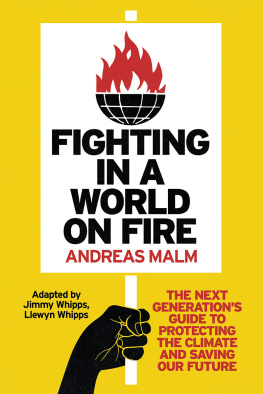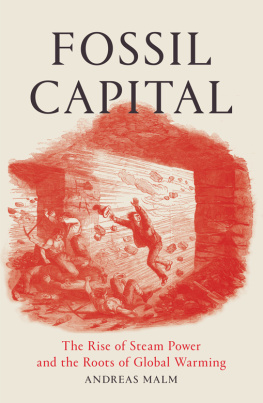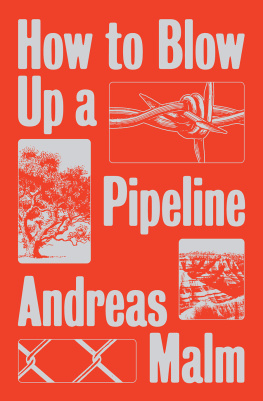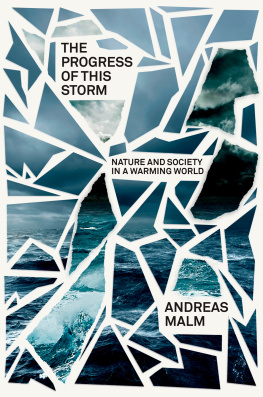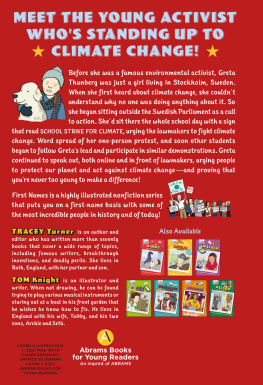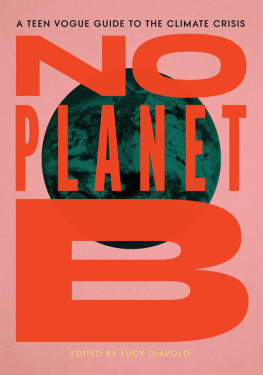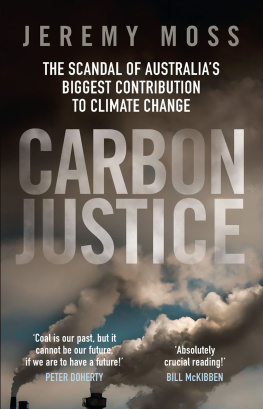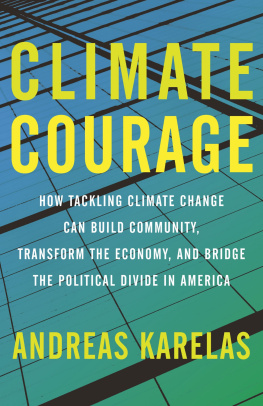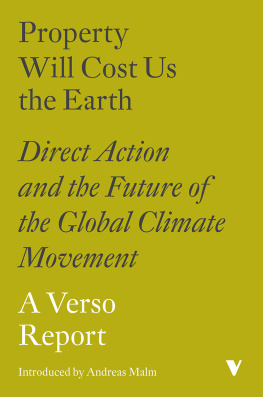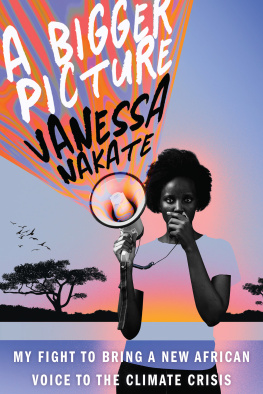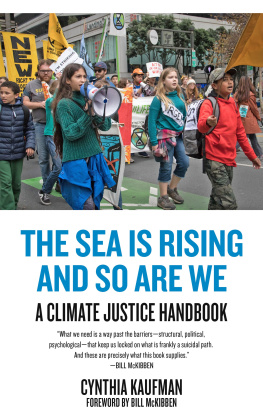Contents

FIGHTING IN
A WORLD ON FIRE
About the Author
Andreas Malm is a scholar of human ecology, and the author of How to Blow Up a Pipeline; Corona, Climate, Chronic Emergency; The Progress of this Storm; and Fossil Capital, which won the Isaac and Tamara Deutscher Memorial Prize.
About the Adapters
Jimmy Whipps is a lifetime resident of Portland, Oregon. He enjoyed a twenty-year career in education, primarily as a middle school social sciences teacher. He has been involved in a variety of actions, marches, and protests.
Llewyn Whipps is a habitat restoration practitioner working primarily on Kalapuyan land. They attended their first protest as an elementary schooler, with their father Jimmy. They have been a participant in the climate movement since their early twenties, joining fights for fossil fuel divestment, against industrial logging, and to stop oil trains and drill rigs.

First published by Verso 2023
Andreas Malm 2023
Adaptation Jimmy Whipps and Llewyn Whipps 2023
The publishers and adapters have endeavored to credit all photos accurately and to seek permission where required. On being informed of any mistakes or omissions, the publisher will rectify the error at the first opportunity.
All rights reserved
The moral rights of the author have been asserted
1 3 5 7 9 10 8 6 4 2
Verso
UK: 6 Meard Street, London W1F 0EG
US: 388 Atlantic Avenue, Brooklyn, NY 11217
versobooks.com
Verso is the imprint of New Left Books
ISBN-13: 978-1-80429-125-2
ISBN-13: 978-1-80429-127-6 (UK EBK)
ISBN-13: 978-1-80429-126-9 (US EBK)
British Library Cataloguing in Publication Data
A catalogue record for this book is available from the British Library
Library of Congress Cataloging-in-Publication Data
Names: Malm, Andreas, 1977 author. | Malm, Andreas, 1977 How to blow up a pipeline.
Title: Fighting in a world on fire : the next generations guide to protecting the climate and saving our future / Andreas Malm ; adapted by Jimmy Whipps, Llewyn Whipps.
Description: 1st edition paperback. | London ; Brooklyn, UK : Verso, 2023. | Audience: Ages 10+
Identifiers: LCCN 2022047102 (print) | LCCN 2022047103 (ebook) | ISBN 9781804291252 (paperback) | ISBN 9781804291276 (UK EBK) | ISBN 9781804291269 (US EBK)
Subjects: LCSH: Energy industriesEnvironmental aspectsJuvenile literature. | Climate change mitigationJuvenile literature. | EcoterrorismJuvenile literature. | Climatic changesJuvenile literature.
Classification: LCC TD170.15 .M34 2023 (print) | LCC TD170.15 (ebook) | DDC 363.738/74dc23/eng/20221012
LC record available at https://lccn.loc.gov/2022047102
LC ebook record available at https://lccn.loc.gov/2022047103
Typeset in Garamond by MJN Gavan, Truro, Cornwall
Printed and bound by CPI Group (UK) Ltd, Croydon CR0 4YY
CONTENTS
W e want to extend our appreciation to our family and friends who encouraged us to take on this adaptation and who contributed their thoughts, ideas, and support.
Our thanks go especially to Jessie Kindig, our editor at Verso. She saw the potential for this project and shepherded the book (and us!) through the maze of publishing. We would also like to acknowledge her for her keen insights and most excellent editing skills.
We also need to thank Andreas Malm, who has only been enthusiastic about this work. His original text shook us and compelled us to keep the conversation going. Since Jimmy first emailed him with a wild idea, he has been a cheerleader from afar, and we thank him for his trust.
WHY ADAPT THIS BOOK FOR
THE NEXT GENERATION?
W e first read How to Blow Up a Pipeline in 2021, when the COVID-19 pandemic was still a major force on the world, and the climate movement had, for all intents and purposes, lost the wind in its sails.
Well admit, we were feeling pretty hopeless. But reading the book ignited a spark in us, both illuminating the size of the problem and showing us we can work to stop it, that we must work to stop it. We wanted to share it with everyone, which led us to create this version, geared toward youth activists and anyone who wants to take action to halt climate change.
Now, as we write these words, pandemic restrictions are lifting, and Russias war in Ukraine is sending many countries scrambling for new sources of energy as sanctions on Russian oil and gas take hold. A heatwave rages in India and Pakistan, and deforestation of the Amazon rainforest is at a record high. We continue on a collision course with disaster, but the climate movement shows signs of waking up. Its hard to know what will come next.
The point is that conditions are always changing. We are writing from the past. Whenever you pick this book up, we hope you read it with an eye to when it was written. That is, whatever has happened between when we write this and when you read this, we hope you use the ideas weve shared and the history weve traced to ask questions of the present you find yourself in. The story is never complete!
The question of which tactics are most useful can also never fully be answered in the moment, only with the passage of time. This book offers one perspective (and one that is often suppressed), but it is not the only one. No one can know what the future holds, what will actually work to shift minds and change possibilitiesand anyone who says they know is lying. All we can do is keep our eyes and ears open, study the past, look to our own triumphs and failures, and keep tryingforging ahead with creativity, empathy, humility, and adaptability.
Whether this is new for you or youre already full of fire, we hope this book reminds you that the struggle for a better world has been going on for generations and generations. Stepping into it is stepping into a long tradition and a deep-seated community. We hope to see you in that community and in a future we can make possible by putting to work our unique perspectives, skills, determination, and love.
Jimmy Whipps and Llewyn Whipps
Portland, Oregon
May 2022
THE PROBLEM WITH
BUSINESS-AS-USUAL
O n the last day of negotiations, we geared up for our most daring action yet. We had been camping out in a shabby gymnasium in the eastern part of the city for a week. My friends and I had arrived there on a dilapidated buson the road, in the middle of the night, the exhaust pipe had fallen offbut when we spread out on the yard of the sports center we felt the rush of entering an alternative world. It was a place where business-as-usual had been suspended. A communal kitchen served vegan food. Assemblieswhere the action planning and organizing took placewere open to anyone with something to say. During one workshop, a man from Bangladesh outlined the devastating consequences of rising sea levels for his country; at another, delegates from small island nations came to voice their distress as well as their support. My friends and I secured an audience with our environmental minister and urged her to ratchet up ambitions across the board. The science, after all, had been clear for a long time.
One day we poured out of the subway stations and onto a busy junction in the middle of the city and blocked the traffic with banners calling for emissions to be slashed. Activists played guitars and violins while others danced; some juggled; some handed out sunflower seeds to angry motorists. We had no intention of confronting the police or anyone else; wed rather get arrested than throw a bottle or a stone. The next day, we flooded a boulevard with an elaborate form of street theater. Dressed up as trees, flowers, and animals, we lay down on the street to be run over by a vehicle built of cardboard and wood to symbolize business-as-usual. Striding through the crowd, protesters in United Nations delegate costumes carried signs saying, Blah-Blah-Blah, and did nothing.

